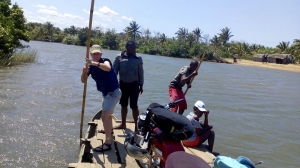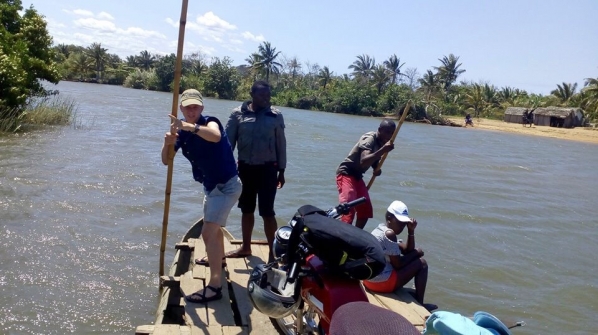During fall 2018, senior sustainable development major Patrick Ross embarked on the journey of a lifetime to the remote forest of Anjanaharibe-Sud Special Reserve on the island of Madagascar. With the help of a Gilman Scholarship, Ross spent a semester conducting a biodiversity assessment to catalog small carnivores that live in the rainforest.
“I’ve wanted to protect the rainforest since I was a kid,” he shared. “It’s such an incredibly unique place that holds more life than any other place on planet. I wanted to do something to make a difference – something that would impact conservation.”
A Durham resident, Ross’s passion for Madagascar blossomed during his work at the Duke Lemur Center. In an attempt to gain more knowledge about potential project ideas, he reached out to the Lemur Conservation Foundation (LCF), and specifically Dr. Erik Patel, for advice.
“I asked Erik what I could do — how could I fulfill a need — and it turns out very little is known about smaller animals and carnivores that live in the forests of Madagascar,” he said.
According to Ross, carnivores are often the most at-risk animals in situations of forest degradation, so knowing how many and what type are currently present will help researchers and conservation organizations see change over time.
As luck would have it, Appalachian’s Dr. Zach Farris is a leading researcher in carnivore ecology, specifically focusing on Madagascar.
With the LCF willing to fund a large part of his project, Ross approached Farris, who is an assistant professor in the Beaver College of Health Sciences Department of Health and Exercise Science. Impressed with Ross’s idea and ambition, Farris loaned him several trail cameras for his trip and provided advice and mentorship as he planned his study.
Farris says he met with Ross numerous times to develop, design and prepare the complex project.
“Patrick worked closely with myself and other mentors to acquire maps and imagery to design his sampling grid, he raised funds and wrote grants to purchase equipment, he and I drafted, submitted and were granted a permit by Madagascar National Parks to allow the first survey of this newly protected area, and he organized and led a team of Malagasy researchers to conduct his survey,” shared Farris. “His work has resulted in hundreds of thousands of data points which he is currently entering and beginning to analyze.”
Ross placed the cameras, which are motion and heat activated, in various areas throughout the forest during his month-long trek in November. The cameras will continue running until the study concludes in March. According to Ross, this is the first and longest assessment of its kind, and preliminary results show that there are at least three carnivores that exist in forest.
Farris applauds Ross’s maturity as an undergraduate.
“This unforgettable experience sets up him exceedingly well for almost any graduate program in the world,” he said. “Patrick will have international field experience leading a research team in a remote, undeveloped part of the world, grant writing experience, experience working with a foreign government to acquire research permits, numerous professional presentations and be an author on at least two scientific publications.”
Ross, who is one of 835 undergraduate students from 310 colleges and universities across the United States selected to receive the prestigious Gilman Scholarship, says that the experience has deepened his understanding of the rainforest and increased his enthusiasm for additional research.
“I want to conduct more assessments and continue research and action toward applied conservation. Ideally, I’ll head back to Madagascar this summer. It’s an amazing place and I’m grateful for the opportunity.”
About the Gilman International Scholarship Program
The Gilman International Scholarship Program, funded by the U.S. Department of State, offers grants of up to $5,000 to allow U.S. undergraduate students from diverse backgrounds to participate in credit-bearing study abroad programs and career-orientated internships. The deadline for summer and fall Gilman Awards is Tuesday, March 5, 2019 at 11:59 p.m. Central Standard Time. For more information about Gilman and how to apply, please contact Nationally Competitive Scholarships at ncs@appstate.edu or visit https://ncs.appstate.edu.
About the Goodnight Family Department of Sustainable Development
One of seven departments housed in the College of Fine and Applied Arts, the Goodnight Family Department of Sustainable Developmentat Appalachian State University prepares students to thoughtfully analyze human development while focusing on the applied practice of pursuing transformative, community-driven development and social change. It offers a Bachelor of Science degree in sustainable development with concentrations in agroecology and sustainable agriculture; community, regional and global development; and environmental studies; as well as a Bachelor of Arts and minor in sustainable development.
About the Beaver College of Health Sciences
Appalachian's Beaver College of Health Sciences opened in 2010 as the result of a strategic university commitment to significantly enhance the health and quality of life for individuals, families and communities in North Carolina and beyond. In 2015, the college was named for an Appalachian alumnus and pioneer in the health care industry — Donald C. Beaver ’62 ’64 of Conover. The college offers 10 undergraduate degree programs and six graduate degree programs, which are organized into six departments: Communication Sciences and Disorders; Health and Exercise Science; Nursing; Nutrition and Health Care Management; Recreation Management and Physical Education; and Social Work. Learn more at https://healthsciences.appstate.edu.
About Nationally Competitive Scholarships at Appalachian
Nationally Competitive Scholarships (NCS) works with the Appalachian community to recruit and support students for nationally competitive scholarships and fellowships, including those that support research, teaching and critical language learning. This is achieved with outreach, mentorship and advising throughout the entire application and selection process. NCS is committed to helping undergraduate and graduate students find ways to connect their Appalachian education to their future endeavors through scholarship opportunities. Learn more at https://ncs.appstate.edu.

